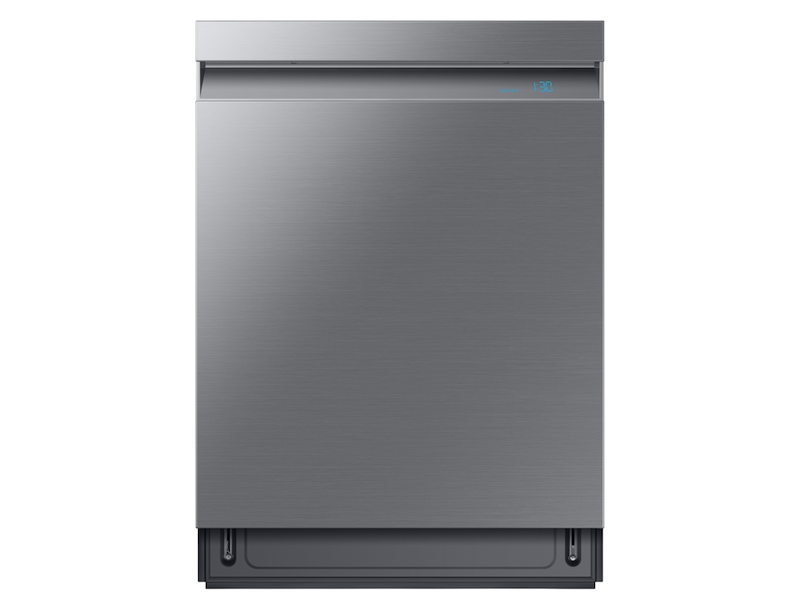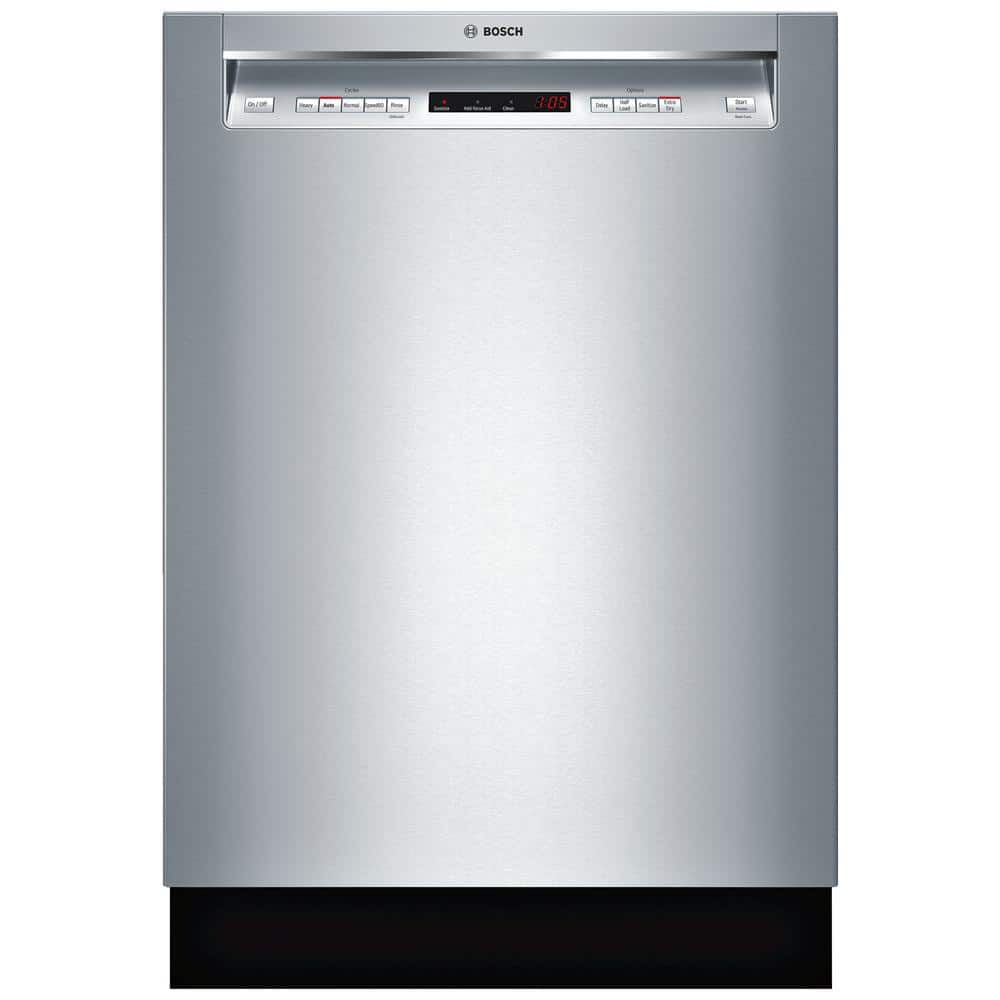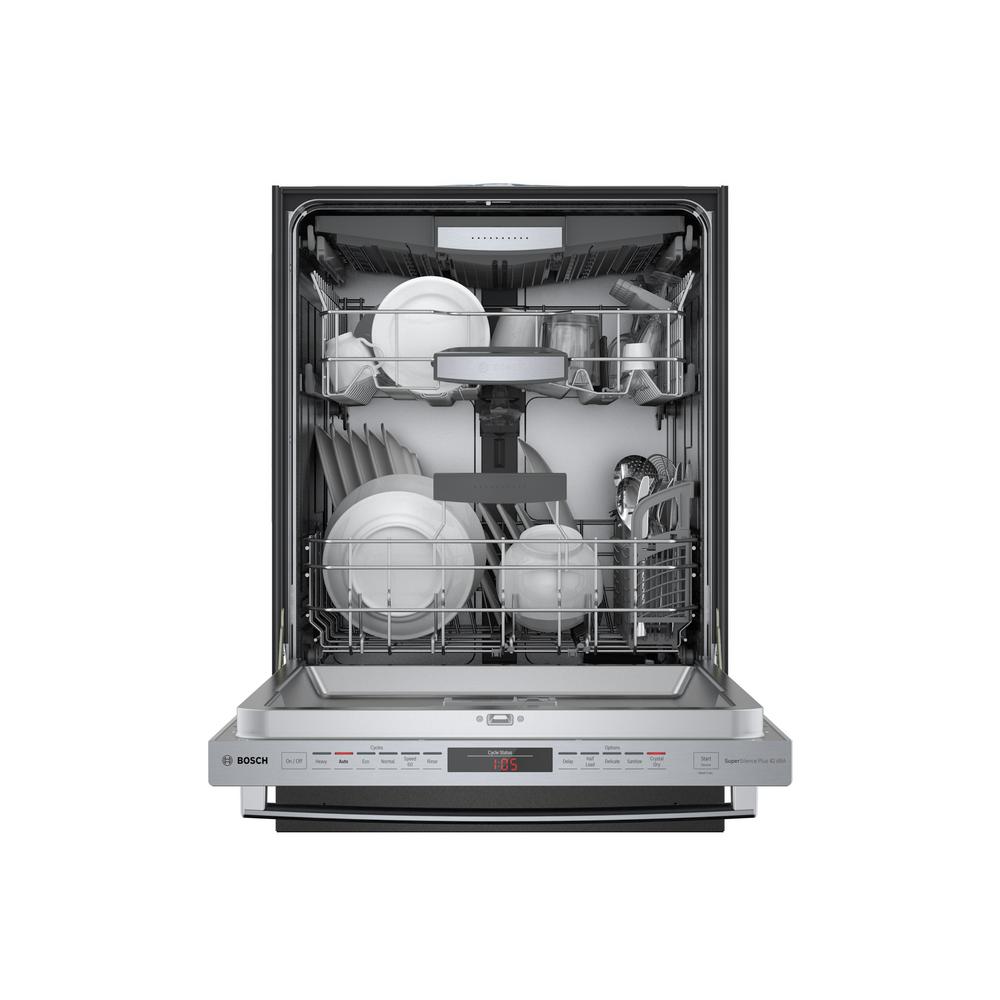Samsung Linear Wash 39dBA Dishwasher in Stainless Steel Dishwashers – DW80R9950US/AA | Samsung US
-
( 5 Reviews )Rated 4.80 out of 5 based on 5 customer ratings05
Discover the latest features and innovations available in the Linear Wash 39dBA Dishwasher in Stainless Steel. Find the perfect Dishwashers for you! Linear Wash System – Remarkable cleaning results. Whisper Quieting Cleaning – Virtually silent wash cycle.
-
Samsung Series 6 DW60M6050FW Standard Dishwasher – White – A++ Rated
Rated 4.40 out of 505Samsung Series 6 DW60M6050FW Standard Dishwasher – White – A++ Rated
Rated 4.40 out of 505
Linear Wash System
AquaBlast™ jets provide corner to corner coverage for superior cleaning.
Whisper Quiet Cleaning
Less noise and less disturbance with virtually silent wash cycles at 39 dBA.
AutoRelease™ Door
At the end of a cycle, the door automatically opens to circulate air and improve drying performance.
Flexible 3rd Rack
The flexible 3rd rack provides extra space to load silverware. Use adjustable section for oversized utensils.
Zone Booster™
Zone Booster™ provides additional water stream to bottom left area for hard to clean pots and pans.
Fingerprint Resistant Finish
Fingerprint resistant exterior helps reduce smudges for an everyday great appearance.
Wi-Fi Connectivity
Remotely monitor and control the dishwasher from your smartphone with Wi-Fi connectivity.
Additional information
| Product Weight | 95 lbs. |
|---|---|
| Width | 23 7/8" |
| Product Dimensions | 25" D x 33.9" H x 23.9" W |
| Product Height w/ Legs Extended | 35" |
| Depth | 25" |
| Shipping Weight | 101 lbs. |
| Shipping Dimensions | 29.8" D x 34.8" H x 26" W |
A dishwasher is a machine that is used to clean dishware, cookware, and cutlery automatically. Unlike manual dishwashing, which relies on physical scrubbing to remove soiling, the mechanical dishwasher cleans by spraying hot water, typically between 45 and 75 °C (110 and 170 °F), at the dishes, with lower temperatures of water used for delicate items.
A mix of water and dishwasher detergent is pumped to one or more rotating sprayers, cleaning the dishes with the cleaning mixture. The mixture is recirculated to save water and energy. Often there is a pre-rinse, which may or may not include detergent, and the water is then drained. This is followed by the main wash with fresh water and detergent. Once the wash is finished, the water is drained; more hot water enters the tub by means of an electromechanical solenoid valve, and the rinse cycle(s) begin. After the rinse process finishes, the water is drained again and the dishes are dried using one of several drying methods. Typically a rinse-aid, a chemical to reduce the surface tension of the water, is used to reduce water spots from hard water or other reasons.
In addition to domestic units, industrial dishwashers are available for use in commercial establishments such as hotels and restaurants, where many dishes must be cleaned. Washing is conducted with temperatures of 65–71 °C (149–160 °F) and sanitation is achieved by either the use of a booster heater that will provide an 82 °C (180 °F) "final rinse" temperature or through the use of a chemical sanitizer.
Samsung Group (Korean: 삼성; Hanja: 三星; RR: samseong [samsʌŋ]; stylised as SΛMSUNG) is a South Korean multinational manufacturing conglomerate headquartered in the Samsung Town office complex in Seoul. The group consists of numerous affiliated businesses, most of which operate under the Samsung brand, and is the largest chaebol (business conglomerate) in South Korea. As of 2024, Samsung has the world's fifth-highest brand value.
Founded in 1938 by Lee Byung-chul as a trading company, Samsung diversified into various sectors, including food processing, textiles, insurance, securities, and retail, over the next three decades. In the late 1960s, Samsung entered the electronics industry, followed by the construction and shipbuilding sectors in the mid-1970s—areas that would fuel its future growth. After Lee died in 1987, Samsung was divided into five business groups: Samsung Group, Shinsegae Group, CJ Group, Hansol Group, and JoongAng Group.
Key affiliates of Samsung include Samsung Electronics, the world's largest information technology company, consumer electronics maker and chipmaker by 2017 revenues; Samsung Heavy Industries, the world's second-largest shipbuilder by 2010 revenues; and Samsung Engineering and Samsung C&T Corporation, ranked 13th and 36th among global construction companies, respectively. Other significant subsidiaries are Samsung Life Insurance, the 14th-largest life insurance company globally, Samsung Everland, operator of Everland Resort (South Korea's oldest theme park), and Cheil Worldwide, the world's 15th-largest advertising agency by 2012 revenues.
Stainless may refer to:
- Cleanliness, or the quality of being clean
- Stainless steel, a corrosion-resistant metal alloy
- Stainless Games, a British video game developer
- Stainless Broadcasting Company, a TV broadcaster based in Michigan, US
- Stainless Banner, the second national flag of the Confederate States of America
Steel is an alloy of iron and carbon with improved strength and fracture resistance compared to other forms of iron. Because of its high tensile strength and low cost, steel is one of the most commonly manufactured materials in the world. Steel is used in buildings, as concrete reinforcing rods, in bridges, infrastructure, tools, ships, trains, cars, bicycles, machines, electrical appliances, furniture, and weapons.
Iron is always the main element in steel, but many other elements may be present or added. Stainless steels, which are resistant to corrosion and oxidation, typically are 18% chromium.
Iron is the base metal of steel. Depending on the temperature, it can take two crystalline forms (allotropic forms): body-centred cubic and face-centred cubic. The interaction of the allotropes of iron with the alloying elements, primarily carbon, gives steel and cast iron their range of unique properties. In pure iron, the crystal structure has relatively little resistance to the iron atoms slipping past one another, and so pure iron is quite ductile, or soft and easily formed. In steel, small amounts of carbon, other elements, and inclusions within the iron act as hardening agents that prevent the movement of dislocations.
The carbon in typical steel alloys may contribute up to 2.14% of its weight. Varying the amount of carbon and many other alloying elements, as well as controlling their chemical and physical makeup in the final steel (either as solute elements, or as precipitated phases), impedes the movement of the dislocations that make pure iron ductile, and thus controls and enhances its qualities. These qualities include the hardness, quenching behaviour, need for annealing, tempering behaviour, yield strength, and tensile strength of the resulting steel. The increase in steel's strength compared to pure iron is possible only by reducing iron's ductility.
Steel was produced in bloomery furnaces for thousands of years, but its large-scale, industrial use began only after more efficient production methods were devised in the 17th century, with the introduction of the blast furnace and production of crucible steel. This was followed by the Bessemer process in England in the mid-19th century, and then by the open-hearth furnace. With the invention of the Bessemer process, a new era of mass-produced steel began. Mild steel replaced wrought iron. The German states were the major steel producers in Europe in the 19th century. American steel production was centred in Pittsburgh; Bethlehem, Pennsylvania; and Cleveland until the late 20th century. Currently, world steel production is centered in China, which produced 54% of the world's steel in 2023.
Further refinements in the process, such as basic oxygen steelmaking (BOS), largely replaced earlier methods by further lowering the cost of production and increasing the quality of the final product. Today more than 1.6 billion tons of steel is produced annually. Modern steel is generally identified by various grades defined by assorted standards organizations. The modern steel industry is one of the largest manufacturing industries in the world, but also one of the most energy and greenhouse gas emission intense industries, contributing 8% of global emissions. However, steel is also very reusable: it is one of the world's most-recycled materials, with a recycling rate of over 60% globally.






by Chris
I bought this a month ago, and I’m so happy to have that.
by Kelly
Purchased this with my new home and it was available in tuscan which matched my fridge, so I was delighted. Overall it works okay and it’s so quiet, nice and roomy and I love the utensils rack and the adjustable glass rack. However for some reason it stopped opening at the end of the cycle to let the steam out as this is what dries the dishes.
So my cons it doesn’t dry accurately, unless I catch when it finishes and manually open the door. Also it would be nice if it had a ronse and dry only feature, which would also help.
by Theresa
I’ve had this washing machine for a few months now and I absolutely love it. Firstly the design of the washing machine is gorgeous. it would stand out beautifully in any kitchen.
It’s absolutely silent as well. You wouldn’t even realize it’s running if not for the indicator LEDs. It also does a fantastic job cleaning. Our vessels generally come out looking perfectly clean. it also has wifi functionality and if you have the smart things app it’ll tell you how long the load is going to take etc. As for drying it doesn’t have an inbuilt heater so it pops open the door to dry. Adding rinse aid makes sure that the vessels are dry at the end of the cycle.
As for the negatives. The wifi only works when you switch on the machine so you can’t really start it remotely. Really wish they fixed that.
by Allan
This dishwasher is very quiet. Almost silent, in fact. It can barely be heard when you are in the kitchen. It was very easy to install, and I love the fact the adjusting mechanism for the rear of the machine is accessible from the front, making it very easy to make sure it is level. It also works very well and looks great with my Samsung Tuscan stainless refrigerator and stove.
by Drawoh
haven’t used the kitchenaid dishwasher in our home for over 20 years because it was so noisy in our combined kitchen/living room.
doing research for many months i decided on the b***h brand because of the amazing reviews and how well it cleaned. #1 importance to me was noise level and this washer is quieter than that competitive model. who knew? as a smartthings home automation geek i loved the idea that it connected to my home automation and i could check the status of the wash on my iphone and when it completed i got an alert on my samsung tv. great features like 3 racks and auto open at the end to let out the remaining moisture. it’s soooo quiet! highly recommend.